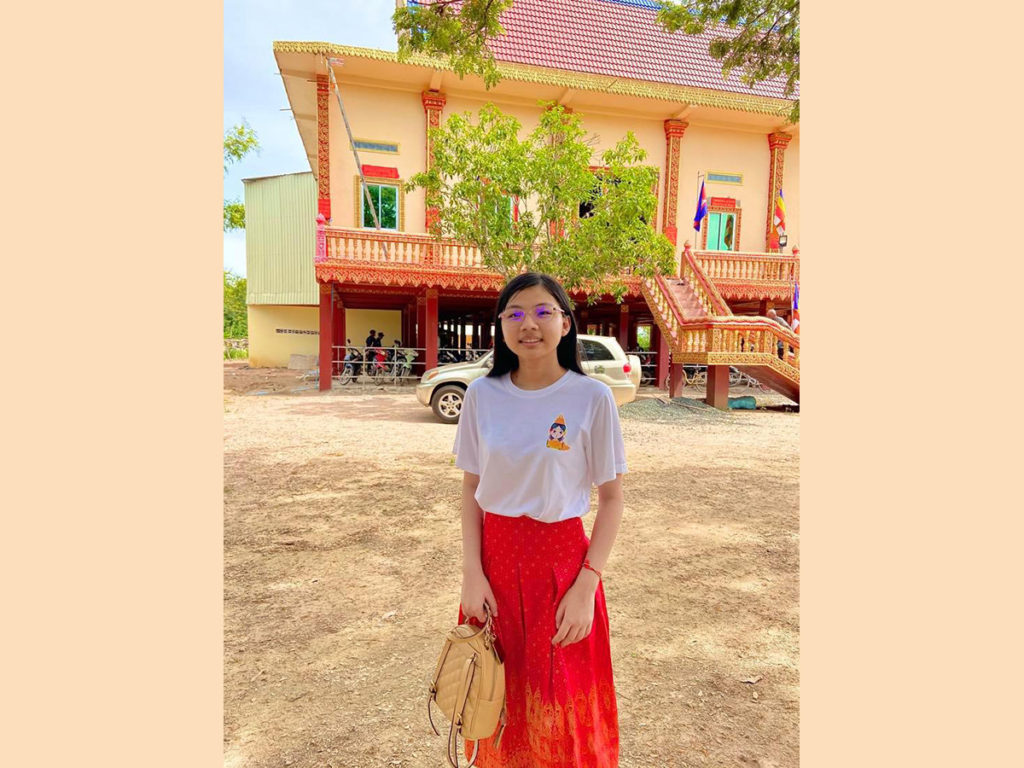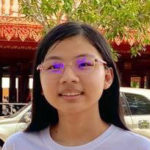“Beyond the dark cloud”
Bun Sreypich
Senior high school student (American Intercon School)
Cambodia
COVID-19 pandemic is one of the greatest health crises that humanity has ever faced. This global challenge poses a tremendous threat to both the livelihood and health of many around the world. In fact, according to the UN’s International Labor Organization, approximately 1.6 billion informal economy workers, which is equivalent to half of the world’s total workforce, will lose their job. Although Cambodia is able to drastically minimize the effect of this global pandemic, as a Cambodian, I have been deeply affected by this problem.
As a senior high school student who is preparing for the national exam, COVID-19 has terribly affected my studies. As Covid-19 becomes more and more serious, many countries, including Cambodia have decided to shut down all schools to prevent further spread of this disease. This poses a serious challenge, especially to 12th graders, as they need all the help that they can get to properly prepare themselves for Bac2 (high school national examination), the golden ticket to entering university. Fortunately, our government has set up a remote-broadcast digital learning system to supplement self-studies. As reported by UNICEF, nine out of ten countries had implemented digital-online learning. With the option of online study, I am able to make use of my time to study for Bac2 and brush up on my Chinese with EDX. Because of Covid-19, I realize that in modern society, although education is very important, it is not accessible enough for young Cambodians. As a person living in the city, I am able to have access to study facilities and foreign language school, yet my cousins in the countryside do not share the same benefits as me. After seeing how powerful and easy online studying is, my friends and I want to work on a start-up idea that provides video courses explaining lessons ranging from sciences to languages, with study materials and private mentorship via social media messaging app. This way, we will be able to promote accessible quality education while also earning some side income when we are in university. We are hoping that Cambodia can slowly adapt to the idea of studying online instead of the traditional classroom-based learning style. After our Bac2, my friends and I are hoping that we will receive enough supports for our ideas to bring them to life.
Although the aftermath is still unclear, I believe that the post-COVID-19 world will be very different. Throughout this period, citizens around the world have seen the flaws in our system. For instance, before covid-19, although hygiene is seen important, it is deemed not a necessity. Simple procedures such as hand washing, hygienic cooking was often overlooked. Yet, during covid-19 several NGOs and government bodies have launches campaigns to promote daily hygiene, such as The WHO’s global hand hygiene campaign SAVE LIVES, CDC’s life is better with clean hands, and Singapore’s SG clean campaign, just to name a few. Through these efforts, we are able to contribute to the flattening of the curve of the spread of Covid-19. In a post-COVID-19 world, I believe that more and more people around the world will pay more attention to personal hygiene, as well as treasure their health as they have realized how important these factors are to them. Likewise, during this chaotic time, people seem to have more awareness about what they do and how their actions will affect them in the future. For example, a growing number of people are beginning to pay attention to their food consumption and how this affects them. On the 24th of February 2020, The National People’s Congress of the People’s Republic of China passed a ban on the act of buying, eating, and selling wild animals in an effort to curb the spread of the global pandemic. This is also an effective measure to prevent future life-threatening diseases to spread into our community again. Home-gardening has also become more and more popular among citizens around the globe. According to George Ball, the chairman of U.S. seed company W. Atlee Burpee & Co, their company reached its highest sale record ever in March, since its founding 114 years ago. In another study done by the Agri-Food Analytics Lab at Dalhousie University, two out of ten Canadians started home-gardening in 2020 and about 67 percent of them admitted to being influenced by the pandemic. As more and more people become interested in urban-farming, we will be able to slowly transit toward a self-sustainable society, with less dependent on logistic and commercial farming. This way, after the pandemic we will be able to reduce our global carbon footprint because 11 percent of the greenhouse gas emission in food production is caused by food transportation, as cited in science daily. In order for these visions to come true, proper steps needed to be taken. As our world becomes more globalized thanks to the help of social media, we can utilize the voice of the next generation to promote the importance of global personal hygiene by running local campaigns with local schools and communities while staying connected globally. We can also connect with farming experts around the world through video calls, real-time demonstrations, or small-scale events to further promote and introduce the concept of urban-farming to society. A next-generation start-up like Damdos, an agricultural start-up by a group of students in CAM-ED business school, is one example of how young leaders can contribute to making this vision into a reality.
Although covid-19 is hard on everyone, but as Henry Kissenger once said “a diamond is a chunk of coal that did well under pressure”. As we undergo this transformation process, we will suffer along the way but we will also emerge with new-found strength, knowledge, mindset, and growth. After covid-19 we will not return to our old life but walk toward a sustainable world of the future.
COVID-19パンデミックは、人類がこれまでに直面した最大の健康危機の一つです。この世界的な課題は、世界中の多くの人々の生活と健康の両方に多大な脅威をもたらしています。実際、国連の国際労働機関によると、世界の全労働力の半分に相当する約16億人の非公式経済労働者が職を失うことにな流そうです。カンボジアはこの世界的なCovid-19の大流行の影響を抜本的に抑えることができますが、カンボジア人として、この問題の影響を深く受けてきました。
国家試験を控えた高校生として、COVID-19は私の勉学にひどく影響しています。COVID-19の深刻化に伴い、カンボジアを含む多くの国では、これ以上の感染拡大を防ぐために、すべての学校を閉鎖することを決定しました。これは深刻な問題で、特に高校3年生は、大学進学の金字塔であるBac2(高校の国家試験)に向けての準備をするために、あらゆる支援を必要としています。幸いなことに、政府は自習を補うために遠隔放送のデジタル学習システムを設置しました。ユニセフの報告によると、10カ国中9カ国がデジタルオンライン学習を導入していました。オンライン学習という選択肢があるので、Bac2の勉強やEDXでの中国語の学習に時間を使うことができます。Covid-19は、現代社会では、教育はとても重要であるにも関わらず、若いカンボジア人にとっては十分にアクセスできていないことを浮き彫りにしました。都会に住んでいる私は、学習施設や外国語学校を利用することができますが、田舎のいとこたちは私と同じような恩恵を受けられていません。オンライン学習がどれほど強力で容易なのかを実感してきた私と友人は、科学から語学までの授業をビデオで説明するコースを提供し、教材とSNSのメッセージアプリを使った個人指導を提供するスタートアップのアイデアに取り組みたいと思っています。そうすれば、大学にいるときに副収入を得ながら、アクセスしやすくて質の高い教育を推進することができるようになります。私たちは、カンボジアが伝統的な教室での学習スタイルではなく、オンラインで勉強するという考え方にゆっくりと適応できるようになることを願っています。Bac2の後、私と私の友人は、私たちのアイデアを実現するのに十分な支援を受けられることを期待しています。
その余波はまだ明らかではありませんが、COVID-19後の世界は大きく変わっていると思います。この期間を通して、世界中の市民は私たちのシステムの欠陥を目の当たりにしてきました。例えば、COVID-19以前は、衛生面が重要視されていますが、それは必要ではないと考えられています。手洗い、衛生的な料理のような単純な手順は、しばしば見落とされていた。しかし、covid-19の間、いくつかのNGOや政府機関は、WHOの世界的な手指衛生キャンペーン「SAVE LIVES」、CDCの「Life is better with clean hands」、シンガポールのSGクリーンキャンペーンなど、日常の衛生を促進するためのキャンペーンを開始しています。これらの取り組みを通じて、私たちはコビド-19の普及曲線の平坦化に貢献することができます。ポストCOVID-19の世界では、世界中のより多くの人々が個人の衛生にもっと注意を払い、健康を大切にするようになると信じています。同様に、この混沌とした時代の中で、人々は自分の行動が将来的にどのように影響するかについて、より多くの意識を持っているようです。例えば、多くの人が自分の食生活とそれが自分にどのように影響するかに注意を払い始めています。2020年2月24日、中華人民共和国の全国人民代表大会では、世界的なパンデミックの蔓延を抑制するため、野生動物を売買する行為を禁止する法案が可決されました。これは、将来的に命を脅かす病気が再び私たちの地域社会に蔓延することを防ぐための有効な対策でもあります。家庭菜園もまた、世界中の市民の間で人気が高まっています。米国の種子会社W.アトリー・バーピー社の会長ジョージ・ボール氏によると、同社は114年前の創業以来、3月に過去最高の売り上げを記録したという。ダルハウジー大学のアグリフード・アナリティクス・ラボが行った別の調査では、カナダ人の10人に2人が2020年に家庭菜園を始め、そのうち約67%がパンデミックの影響を受けていることを認めている。都市農業に興味を持つ人が増えれば、ロジスティック農業や商業農業への依存度が低く、自立可能な社会へとゆっくりと移行していくことができるようになるだろう。そうすれば、パンデミックの後には、食糧生産における温室効果ガス排出量の11%が食糧輸送によるものであることから、世界的な二酸化炭素排出量を削減することができるだろう。これらのビジョンを実現するためには、適切な手順を踏む必要があります。ソーシャルメディアのおかげで世界がよりグローバル化している今、私たちは次世代の声を活用して、グローバルなつながりを保ちながら、地域の学校やコミュニティとのキャンペーンを実施することで、世界的な個人衛生の重要性を広めることができます。また、ビデオ通話やリアルタイムのデモンストレーション、小規模なイベントなどを通じて世界中の農業の専門家とつながり、都市型農業の概念をさらに広め、社会に紹介することができます。CAM-EDビジネススクールの学生グループによる農業スタートアップ「ダムドス」のような次世代型スタートアップは、若いリーダーがこのビジョンの実現に貢献できる一例です。
covid-19は誰にとってもハードですが、ヘンリー・キッセンジャーがかつて言ったように、「ダイヤモンドはプレッシャーの下でうまくいった石炭の塊」です。私たちがこの変革のプロセスを経るとき、私たちは道に沿って苦しむことになるでしょうが、私たちはまた、新しい発見の強さ、知識、考え方、そして成長と一緒に現れるでしょう。covid-19の後、私たちは以前の生活に戻るのではなく、未来の持続可能な世界に向かって歩いていくのです。

References :
- (2020, April 29). Retrieved November 13, 2020, from https://www.ilo.org/global/about-the-ilo/newsroom/news/WCMS_743036/lang–en/index.htm
- Carnegie Mellon University. (2008, April 22). Want To Reduce Your Food-related Carbon Footprint? What You Eat Is More Important Than Where It Came From. ScienceDaily. Retrieved November 15, 2020 from www.sciencedaily.com/releases/2008/04/080421161338.htm
- Dalhousie University, A. (2020, October 07). Home Food Gardening during COVID‑19. Retrieved November 15, 2020, from https://www.dal.ca/sites/agri-food/research/home-food-gardening-during-covid-19.html
- Education and COVID-19. (2020, October 29). Retrieved November 13, 2020, from https://data.unicef.org/topic/education/covid-19/
- Walljasper, C., & Polansek, T. (2020, April 20). Home gardening blooms around the world during coronavirus lockdowns. Retrieved November 15, 2020, from https://www.reuters.com/article/us-health-coronavirus-gardens-idUSKBN2220D3
- Yang, N., Liu, P., Li, W., & Zhang, L. (2020, March 27). Permanently ban wildlife consumption. Retrieved November 15, 2020, from https://science.sciencemag.org/content/367/6485/1434.2.







